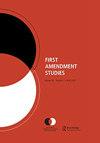在公共人行道上娱乐性的自由表达:城市条例是在把音乐缪斯踢到路边吗?
Q2 Social Sciences
引用次数: 3
摘要
美国宪法第一修正案规定的言论自由是我们民主基础的核心部分。然而,那些利用公共场所进行艺术表达(如音乐)的人仍在争取从这项权利中获益,这项权利对他们通过音乐表演谋生的能力至关重要。从历史上看,无论是在美国还是在其他地方,街头艺人,即那些在街头表演以获取小费的人,在时间、地点和讲话方式上都受到不合理的限制,有时甚至被直接驱逐出受宪法保护的公共场所。本文通过对美国四个城市的历史限制、判例法和现行规章制度的考察,论证了为什么目前对街头表演者的限制明显违反了言论自由。从最高法院获得表面上永久的裁决并不是确保街头表演者言论自由权利的解决方案。相反,我们提出了一个示范法规的例子,如果得到各个地方的接受,可以确保对公共场所音乐家的第一修正案权利的适当保护。本文章由计算机程序翻译,如有差异,请以英文原文为准。
Entertaining free expression on public sidewalks: Are city ordinances kicking musical muses to the curb?
ABSTRACT Freedom of expression, provided by the First Amendment, is a core part of the foundation of our democracy. Yet those who use public places for artistic expression, such as music, are still fighting to benefit from this right, a right vital to their ability to earn a living from musical performances. Historically, both in the United States and elsewhere, buskers, those who perform on the streets for tips, have been subjected to unreasonable restrictions on the time, place, and manner of their speech, and, at times, outright banishment from constitutionally protected public fora. This article demonstrates why current restrictions on street performers constitute clear violations of free speech through an examination of historical restrictions, case law, and the current rules and regulations of four US cities. Obtaining an ostensibly permanent decision from the Supreme Court is not the solution for ensuring the free-speech rights of street performers. Rather, we present an example of model regulations that, if embraced by individual localities, can ensure proper protection for the First Amendment rights of musicians in public spaces.
求助全文
通过发布文献求助,成功后即可免费获取论文全文。
去求助
来源期刊

First Amendment Studies
Social Sciences-Law
自引率
0.00%
发文量
0
期刊介绍:
First Amendment Studies publishes original scholarship on all aspects of free speech and embraces the full range of critical, historical, empirical, and descriptive methodologies. First Amendment Studies welcomes scholarship addressing areas including but not limited to: • doctrinal analysis of international and national free speech law and legislation • rhetorical analysis of cases and judicial rhetoric • theoretical and cultural issues related to free speech • the role of free speech in a wide variety of contexts (e.g., organizations, popular culture, traditional and new media).
 求助内容:
求助内容: 应助结果提醒方式:
应助结果提醒方式:


